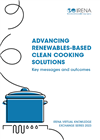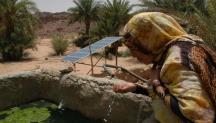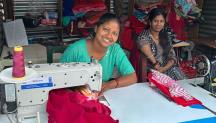

-
-
IRENA (2024), Advancing renewables-based clean cooking: Key messages and outcomes, International Renewable Energy Agency, Abu Dhabi
Copied
https://www.irena.org/-/media/Files/IRENA/Agency/Publication/2024/Mar/IRENA_Renewables-based_clean_cooking_2024.pdf
Copied
Advancing renewables-based clean cooking solutions: Key messages and outcomes
Newsletter
The world continues to fall short in its efforts to achieve universal access to clean cooking by 2030, with disparities in clean cooking access rates persisting across different regions. The 2023 edition of the Tracking SDG 7 report reveals that, although the global population without access to clean cooking decreased from 2.9 billion in 2010 to 2.3 billion in 2021, the current trajectory suggests that 1.9 billion individuals will still lack access to clean cooking by 2030.
Access to clean cooking is not only crucial for achieving the goal of universal energy access; it is also vital to livelihoods, as the use of inefficient and traditional cooking fuels is harmful to human health, the climate and the environment.
Meeting the universal access goal for clean cooking by 2030 will require significant increases in financing, investment and policy support for clean cooking worldwide. Countries have defined strategies that encompass a mix of renewable and non-renewable solutions, depending on factors such as local conditions, resource availability, consumer preference and affordability. Within those strategies, renewable-based clean cooking solutions – including biogas, bioethanol, solid biomass and renewable-based electricity – are often given less attention in the policy and investment discourse compared to other clean cooking options, despite the benefits they offer over their fossil fuel-based counterparts.
In recognition of the crucial role of renewables-based clean cooking solutions, IRENA launched a series of virtual knowledge exchanges in 2023 to facilitate in-depth dialogue on each of the technologies, bringing together practitioners operating in Sub-Saharan Africa and Asia to shed light on their experiences and lessons learned across regions. This brief summarises key findings drawn from these exchanges.




